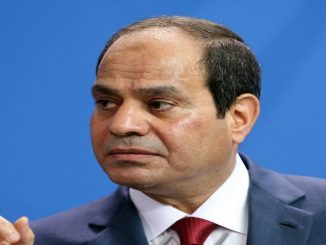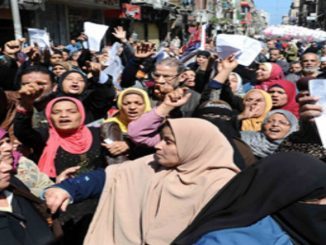
 BY: Yasin Aktay*
BY: Yasin Aktay*
The United Arab Emirates (UAE) and Saudi Arabia, exactly as they are acting against Qatar today, took the lead in this coup bid as well. In this coup, the Saudi-backed, Salafi Noor Party, leftists, the Coptic Church and liberals, as well as the sheikh of El- Azhar and a large section of the media all sided with the coup from the beginning.
The profiles of those in the coup coalition, the language and discourse in the period leading up to the process all contain great lessons. It hadn’t even been a year since Morsi was elected, but even though he was elected as president holding 52 percent of the votes, the leftists and liberals started criticizing him for not sharing the power with others and were muttering that he couldn’t solve Egypt’s century-old problems within 100 days.
These mutterings had begun giving the stimulus needed for the coup. The argument I heard most from liberal and leftist journalists on my visits to Egypt during the Morsi administration was that “Morsi was elected with the votes of unqualified people.” In other words, the typical “shepherd’s vote against a professor’s vote” comparison was popular.
The “default” movement, expressed as a fancy statement against Morsi, was going to organize a huge rally on June 30 at Tahrir square, the symbol of the revolution that took place against Hosni Mubarak on Jan. 25, 2011. The coup plotters, who were undermining Morsi’s “unqualified” votes, had filled this freedom square with herds of “looters” and officially and openly stole the revolution’s glorious square. Titling them, these “looters” were no different to those who were protected in Turkey during the Gezi Park events.
Egypt’s revolutionaries immediately replaced their stolen square with the Raba’a square and all squares of Egypt and, with a completely peaceful resistance, they kept people, in multiple numbers of those revolting against Morsi, at the squares for a month. This stance was completely peaceful – a true revolutionary stance- which had no intention or action of violence. Unfortunately, the anti-violence stance declared from the very beginning had deemed them easy prey for the coup plotters, because these plotters had no values or sensitivity in relation to humans and humanity. They gave the first signals of what they were capable of when they killed dozens of people, opening fire on civilians praying in front of the republic palace one morning. Despite this, through fusillades, they begun dispersing the hundreds of thousands of people who continued their stance at the squares. They set fire to hospitals that were treating people wounded at the squares and crushed the collected bodies with work machines.
As all of this took place, the so-called democratic Western world did not make the slightest peep. The world did not show one percent of the interest it gave to the Gezi Park events, taking place simultaneously in Turkey, regarding the changing of the location of a few trees.
In reality, there is much to say and analyze about the insensitivity of the civilized Western world toward these massacres at the start of a democratic development in the Muslim world. This claim is primarily relevant in relation to how sincere and honest the West is about its democracy claims and particularly about democracy coming to the Muslim world. This attitude is actually a crucial indication of what could have happened if the coup attempted by the Fetullah Terrorist Organization (FETÖ) three years later had been successful.
The international coalition formed against the coup in Egypt re-appeared with the same roles on July 15, 2016. The coalition actually sheds enough light on the nature regarding the Gezi Park events which targeted Turkey as the coup in Egypt occurred simultaneously.
In the four years that passed after the coup in Egypt, everything that took place in Libya, Yemen and Tunisia, all that happened in Turkey after the Gezi Park events, during the Dec. 17 and Dec. 24, 2013 and the July 15, 2016 coup attempts, and what followed in relation to the current Qatar crisis, establishes that they are all interrelated.
Taking a look at the point reached, there are those who say the Arab Spring was, from the very beginning, a part or the start of a plan, targeting such a result. Yet, it may be true that the Arab spring is a process which triggered the various occurrences which followed it, but its start was definitely representative of an awakening of Arab-Muslim peoples, which developed on its own, in the name of protecting their honor, freedom and will.
The movement soon showed a full spring effect in the whole Arab world. An atmosphere of union formed which eliminated the centuries-long discord among the people. Dictators were withdrawing, people were discovering a world in which their free will had value.
This development happening in accordance with the wishes of world sovereigns was against both mind and logic. Hence, the sole topic of concern, at a point everything was going well, was when the sovereigns who established this world a century ago would take to the stage to try and sabotage this process.
They took to the stage in Egypt, then with the process they sabotaged in Syria and Libya they dragged the Muslim world into complete chaos. They couldn’t establish a new order either. They don’t seem to be likely to establish a new order soon or in the medium term either. They are actually delaying the birth of a new, free world. With the coup they attempted and supported in Egypt, they made the biggest mistake of their history. And today, it is because of that big mistake that they are in an even more insecure position in the world surrounding them. As a matter of fact, every step taken to fix the situation further worsens it. It is not smart to run the entire Middle East with a continuous Middle East coup process.
As for spring, it is seasonal and will come again when it is time.
*Yasin Aktay is a member of the Turkish parliament and a leading figure of the ruling Justice and Development (AK Party) in Turkey.
(Published in Yeni Şafak Turkısh newspaper on July 3, 2017)



